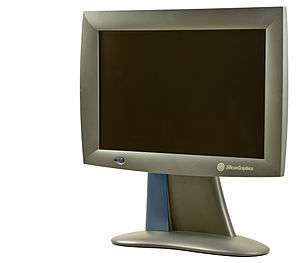SGI 1600SW

The 1600SW is a widescreen flat panel video monitor from Silicon Graphics introduced in 1998. It won many awards after release and sold 54,000 units. It is notable for longevity, with used models still actively traded on eBay a decade later, despite the difficulty of adapting the monitor to run with modern video cards, due to the 1600SW's OpenLDI video interface.
Formac sold the same monitor bundled with its own OpenLDI graphics adapter as Formac ProNitron 18/500. Radius sold the monitor as the Artica which differed mainly in having a translucent white case and a conventional mount. SGI sold the monitor primarily under Model #AM173Y01.
The 1600SW was revolutionary for its time, featuring a 17.3 inch diagonal wide screen panel in a market then dominated by CRT monitors. The 1600SW had a 16:10 aspect ratio (referred to by SGI as SuperWide) with a resolution of 1600 x 1024 pixels. The refresh rate was 60 Hz in 24-bit color and 110 dpi (which makes for a smaller dot pitch than most competitive monitors). The 1600SW shared the same styling motif as the SGI Visual Workstation 320, 540 and O2, with a unique (and troublesome) off-center mount. The display won a dozen international awards and despite its age, it still compares well to modern displays produced a decade later. At introduction the 1600SW cost in the neighborhood of $2500.[1]
List of Video Cards with a 1600SW (OpenLDI) connector
- Formac ProFormance 3 (special version with OpenLDI; PCI bus)
- Number Nine Revolution IV-FP (Revolution IV with OpenLDI; AGP or PCI bus)
- 3D Labs Oxygen VX1-1600SW (AGP or PCI bus)
- Siemens Nixdorf S26361-D964-A11GS-7 (PCI bus)
Monitor switches for OpenLDI
There is a 4-way monitor switch by Dr. Bott called MoniSwitch Pro LDI that allows sharing OpenLDI display among 4 computers, each of which must be equipped with an OpenLDI graphics adapter.
Adapting the 1600SW to Modern Video Cards
OpenLDI is rarely used today, as all popular home and office LCD panel monitors use a DVI or VGA standard connector. There are several companies that make adapter boxes which allow continued use of these older displays. All of these adapters were developed for the 1600SW monitor:
- SGI Multilink Adapter (VGA or DVI) (discontinued)
- Dr. Bott SGI-Saver (DVI)
- PIXsolution PIX-Link 1600SW (DVI) (discontinued)
- GFX-1600SW sold by Niktec (DVI adapter, in passive PCI form factor, also sold built into 1600SW monitors)
SGI referred to video cards that support the 1600SW's 1600 x 1024 resolution as Super Wide Savvy. Most modern cards have no trouble with this resolution, but on PC based machines, problems and screen distortion can exist during system boot. Apple Macintoshes boot directly into the proper resolution. Thus, with a little work, the 1600SW can be adapted to almost any modern computer.
Repair
According to the original SGI project manager Dan Evanicky, the most common failure items are backlights and power supplies. At this point Dan expects that any power supply in continuous use will have failed, though the monitor itself is likely fine. Monitors left on continuous for a decade or more likely have faded backlights.
Generic power supplies work on the unit, specifications are: 3 amps at 12 volts with a 5.5m x 2.5mm center positive coaxial barrel (preferably right angle).
In 2005 Mr. Evanicky purchased the entire spares inventory sitting at Mitsubishi Japan, in order to supply enthusiasts with repair parts.
See also
References
- ↑ "Legacy Products". Silicon Graphics International.
External links
- SGI: Legacy Products: Displays an archive of original material (P/N AM173Y01).
- 1600SW MDR36 connector pinout